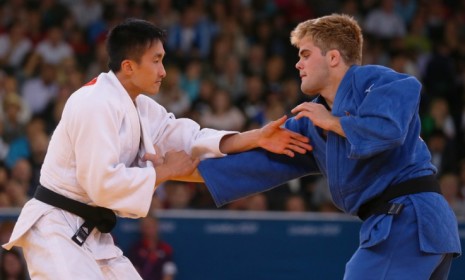Is pot an Olympic performance-enhancing drug?
In a controversial move, the World Anti-Doping Agency expelled an American Olympian after finding traces of marijuana in his system

A free daily email with the biggest news stories of the day – and the best features from TheWeek.com
You are now subscribed
Your newsletter sign-up was successful
American judo practitioner Nick Delpopolo was expelled from the London Games after testing positive for marijuana on Monday. (He claims he unknowingly ate food that had pot baked into it.) Weed is officially listed on the World Anti-Doping Agency's (WADA) list of banned substances, but scientists are calling its banning into question since pot doesn't offer athletes any noted physical advantages. Here, a brief guide to the controversy:
Can weed make you a better athlete?
The consensus: Not really. "I can't think of any sport in which [smoking pot] would be an advantage" in terms of enhancing a user's speed, strength, power, or precision, David Nutt, a professor of neuropsychopharmacology at Imperial College London, tells Reuters. "There's no evidence cannabis is ever performance enhancing in sport, and since its use is legal in a number of countries, there's no reason for it to be banned by the WADA," says Nutt. Other experts, however, contend that marijuana could prove useful in sports like shooting or golf where calm nerves and a steady hand are needed.
The Week
Escape your echo chamber. Get the facts behind the news, plus analysis from multiple perspectives.

Sign up for The Week's Free Newsletters
From our morning news briefing to a weekly Good News Newsletter, get the best of The Week delivered directly to your inbox.
From our morning news briefing to a weekly Good News Newsletter, get the best of The Week delivered directly to your inbox.
Why is it banned?
WADA uses two criteria to determine if an illegal substance goes on its list: Whether it can enhance athletic performance, and whether it is contrary to the spirit of sport. While cannabis won't improve performance in most competitions, evidence suggests it could have a "negative impact," says Reuters, pointing out that weed's active ingredient, THC, "increases blood pressure and heart rate while decreasing cardiac stroke volume, leading to diminished performances." In that sense, marijuana arguably meets WADA's second criterion. When asked to comment on why marijuana is considered a banned substance, WADA officials declined to comment.
Is that really why it's banned?
Well, other factors are probably at play. "The problem is the elite athletes should be seen as role models for young kids," said one British sports scientist who chose not to be named. WADA officials choose to ban cannabis "because they don't want to have the image of gold medalists smoking joints." But pot advocates accuse WADA of being inconsistent: The exact rules stipulate that "stimulants and anabolic steroids" should be illegal, says Brendan Ferreri-Hanberry at the Marijuana Policy Project. "However, caffeine, a stimulant, is not on the list of prohibited substances," and the exact justification isn't clear.
A free daily email with the biggest news stories of the day – and the best features from TheWeek.com
Why is Michael Phelps still swimming while Delpopolo was expelled?
Under WADA's rules athletes can face a two-year ban if cannabis is found in their system "while they are in competition." When U.S. swimmer Michael Phelps was photographed allegedly smoking marijuana out of a glass pipe in 2009, he wasn't competing, and thus wasn't banned. Some scientists argue that "this smacks of double standards," says Reuters.
Sources: The Daily Beast, Marijuana Policy Project, Stop the Drug War, Reuters
-
 The Week Unwrapped: Have televised confessions quelled protests in Iran?
The Week Unwrapped: Have televised confessions quelled protests in Iran?Podcast Plus, why has Elon Musk turned from Mars to the Moon? And will the BBC prove to be a puzzles champ?
-
 The week’s best photos
The week’s best photosIn Pictures An Andean god, a rogue squirrel, and more
-
 ‘Zero trimester’ influencers believe a healthy pregnancy is a choice
‘Zero trimester’ influencers believe a healthy pregnancy is a choiceThe Explainer Is prepping during the preconception period the answer for hopeful couples?